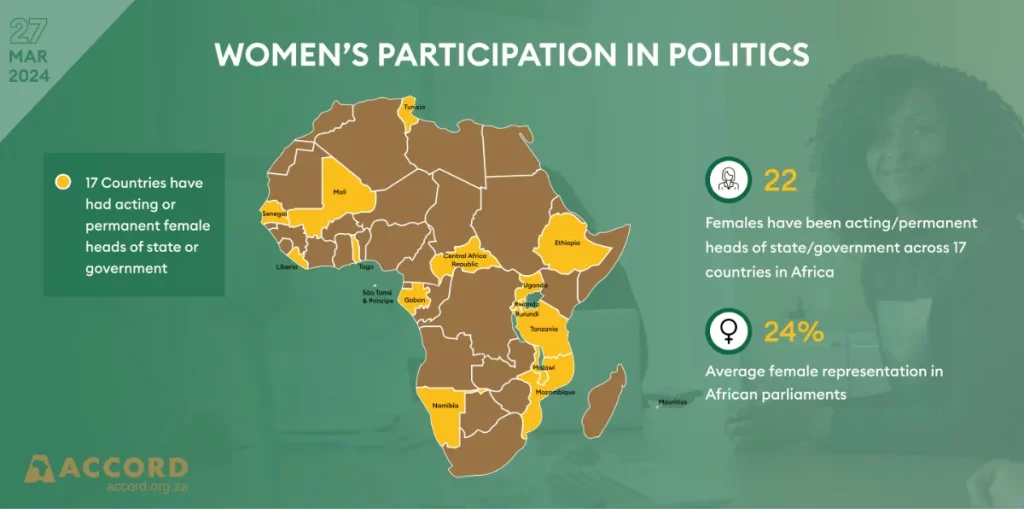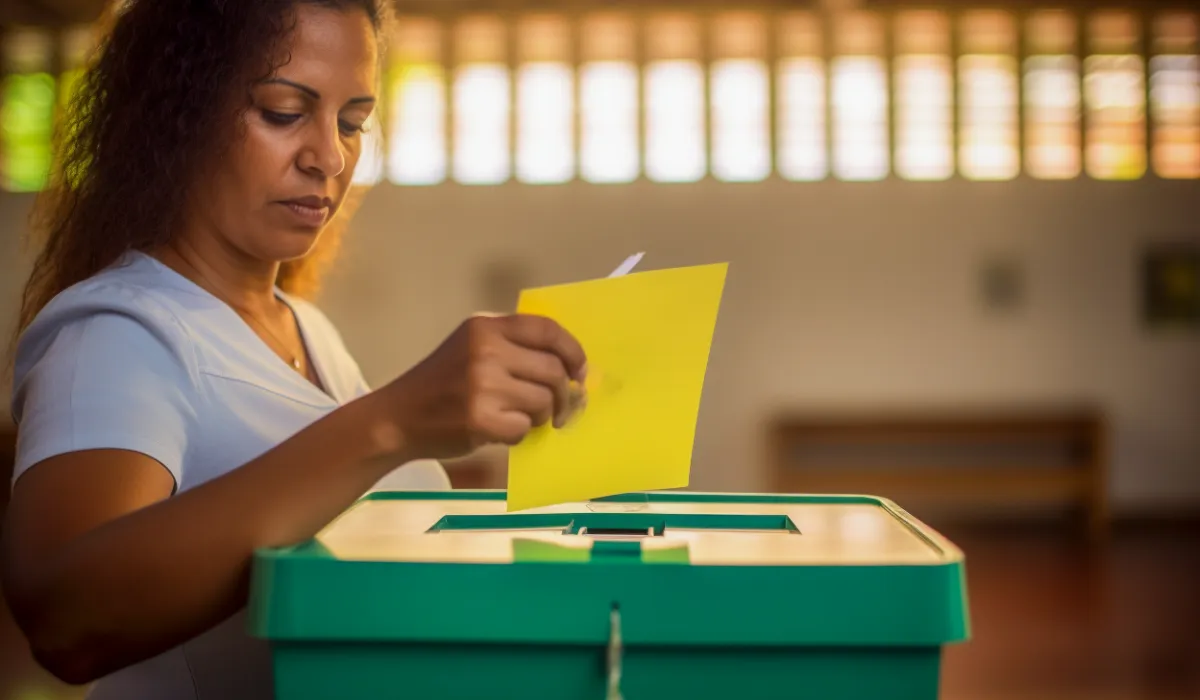Historically, politics have been viewed as a male domain, with women expected not to hold many, if any, political views and opinions, this being illustrated by the fact that women were only given the right to vote in the last century. While advancements have been made over the last century, politics still remains a largely male-dominated arena. Africa is no exception to this reality, with men dominating most of the major political positions in African countries. With more than a third of African states holding elections in 2024, this article looks at female participation in politics in Africa and female participation in recent and upcoming elections.
Africa has had 22 female heads of state or government, either elected or serving in an acting capacity, since the 1970s across 17 different countries, meaning that 32% of Africa’s 55 nations have had a woman occupying the highest political position. While it is significant that women have been able to ascend to top political offices, this alone is not a good indication of women’s participation in politics. Women’s representation at a parliamentary level remains low. In 2021, women made up only 24% of Africa’s parliaments. While this gender balance is strongly skewed in men’s favour, Africa’s representation of women is slightly higher than the world average of 23.5%. This does indicate that female participation in politics at a parliamentary level is not an issue specific to Africa, and that greater efforts worldwide need to be made in order to improve women’s electability.

However, in Africa there are a few outliers, such as Rwanda, where women are in the ascendency, with 60% of the country’s parliamentarians being women. Not only does this place Rwanda well above the world average, it also places the country as one of the world leaders in female political participation, at a parliamentary level. In addition, South Africa has a respectable gender balance of 58/42, in favour of male representation, which still places South Africa as a country with one of the best parliament gender balances in the world. This is in part aided by the governing party, the African National Congress’s (ANC) policy of a 50/50 gender balance of the party’s parliamentary list, also illustrating the effectiveness and viability of policies aimed at improving women’s participation. On the other end of the spectrum, in Nigeria’s parliament, only 6% of parliamentarians are women. In order to address a gender balance as skewed as this it will require a number of years and a number of policies and political will aimed at encouraging women participation in politics from the grassroots level up.
Women’s participation at a parliamentary level is a good measure for female participation in politics. In order to become a head of state of government, in many countries that person is required to have been elected to parliament, while similar requirements also exist for serving in cabinet positions. If there is lower female representation at a parliamentary level, then the likelihood that women will hold key positions in government also decreases. It is also a good judge of a country’s attitude to women’s participation in politics. Low figures such as those in Nigeria, point to the fact that women still face prejudices when running for public office, and societies that still view politics as a male vocation.
Africa has had 22 female heads of state or government, either elected or serving in an acting capacity, since the 1970s across 17 different countries, meaning that 32% of Africa’s 55 nations have had a woman occupying the highest political position.
Tweet
South Africa’s 2024 elections
While South Africa has never had a woman head of state, there are other indicators that suggest a healthy female participation in politics. South Africa’s cabinet has a 50/50 gender balance, and since the country’s democratic dispensation in 1994, women have held a number of key cabinet posts such as minsters of defence, home affairs, health, international relations, and deputy president. The second most powerful position in South Africa, the speaker of parliament, has also been dominated by women, with only one male ever holding the position versus the four women who have held the position. In addition, South Africa’s three capital cities, Pretoria, Cape Town and Bloemfontein, its largest city, Johannesburg and its trading hub, Durban have all had female mayors. This is in addition to eight of the nine provinces having had female premiers on a permanent basis over the past 30 years.
However, of the 14 political parties present in South Africa’s current, 6th parliament, only one party, has a female leader. It must be noted though, that at the time of the 2019 elections, there was a second party elected to parliament with a female leader, the National Freedom Party, but their leader, Zanele kaMagwaza-Msibi, passed away in 2021. The last time a major political party was led by a women, it was the Democratic Alliance (DA), who fielded Hellen Zille as their presidential candidate in the 2014 elections. This is the closest South Africa came to electing a female president through a national election, as the DA finished second in the 2014 elections, with 22.23% of the vote, which was still well short of the ANC’s winning 62.15%.
In South Africa’s upcoming national and provincial elections, scheduled for May this year, none of the major political parties have put forward a woman as their presidential candidate. Of the four largest parties from the previous elections, the ANC, DA, the Economic Freedom Fighters (EFF) and the Inkatha Freedom Party (IFP) are all set to field men as their presidential candidates. Newcomers to the national and provincial elections, Action SA, the MK party, Build One SA and Rise Mzansi are also led by men. As things stand, it is highly unlikely that these 2024 elections will produce a woman president for South Africa if any one of these parties wins an outright majority. The only avenue that will produce a female president in South Africa is if these elections produce a coalition government, and one of the smaller parties, led by a woman, as a kingmaker, is given the position of president in the coalition.
South Africa’s cabinet has a 50/50 gender balance, and since the country’s democratic dispensation in 1994, women have held a number of key cabinet posts such as minsters of defence, home affairs, health, international relations, and deputy president.
Tweet
Other African elections in 2024
In 2024, two elections have already taken place in Africa. The Union of Comoros was the first to hold elections, but of the six candidates that ran for president, none were women. In 2017, Comoros introduced a law to encourage greater female participation in politics with a quota system reserving 30% of elected positions for women. However, this law has yet to be enacted, and women continue to face prejudices relating to their candidacy. This is illustrated by the governor of the Mohéli Island publicly stating that he was unwilling to vote for a female candidate to be his successor in the build up to the 2024 elections.
The second elections to take place, are the elections in Senegal, which were set to take place in February, but were postponed to 24 March. Ninety-three people put their names forward as candidates for the president, six of whom were women. The constitutional council approved a final list of 20 candidates to vie for the position of president, of which only two were women. Of the two women, Rose Wardini pulled out of the elections before a date for the elections was declared following questions concerning her citizenship. This left Anta Babacar Ngom as the only women running for president, and the first woman to run for the position in a decade. She was not expected to win, with all the main candidates in the elections being men. However, women activists in Senegal have hailed her candidacy as a step in the right direction, but also lament the slow progress that is being made to encourage female participation and the entrenched views that participation in politics is not a woman’s role.
Women continue to face discrimination and prejudice relating to their involvement in politics. While progress has been made throughout the continent and women are elected into public office, the rate of progress has been slow. Of the two elections that have taken place already, women have not featured prominently, while in the upcoming elections in South Africa, it is unlikely for a woman to emerge as president. As Africa holds its 20 elections throughout the year, only time will tell if Africa is able to add to the 22 women heads of state or government.


